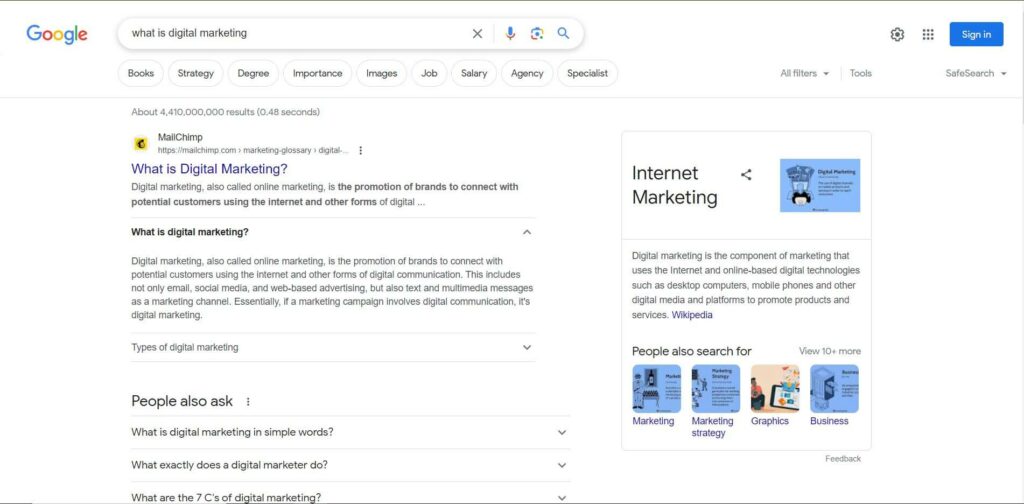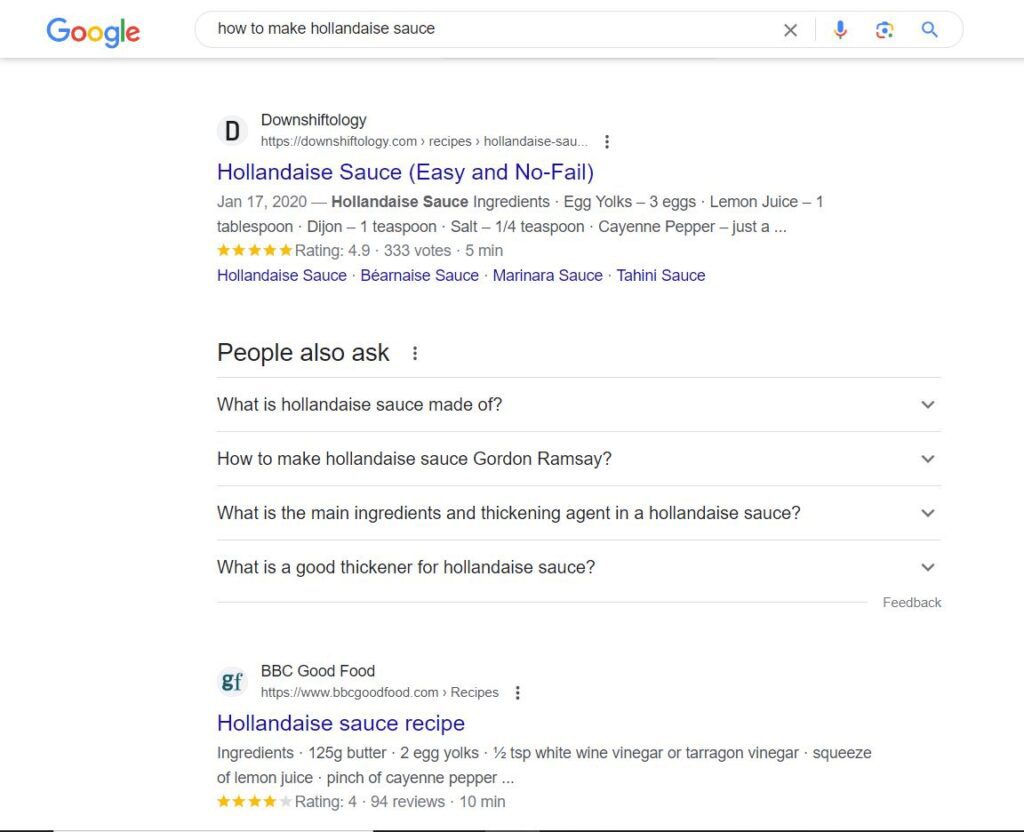
* Due to a recent update, Google will be showing fewer FAQ-rich results across the search result snippets. However, that doesn’t mean that FAQ schema is something you should remove or ignore in your marketing strategy. FAQ schema is still a valuable part of SEO, Google just places less emphasis on it now for sites that are not authoritative government and health sites.
Not all Google SERPs are created equal.
Consider that the CTR on rich and enhanced results is a healthy 58%, while that on standard results is around 41%. Both Google and SEO marketers have caught on to this and are increasingly favoring the former.
FAQ schema is a type of rich result that’s particularly popular. This is because it’s a relatively easy way to have your website show up on the first result page. And unlike with a number of other SEO actions, it doesn’t take months on end to yield results.
Here’s why you should include Google FAQ schema on your site and how to go about doing it.
Table of Contents
What Is FAQ Schema?
A schema markup is essentially standardized code in the form of structured data. It helps Google understand the meaning of your page, its elements, and how to categorize it for use.
Structured data is an integral part of rich results. By feeding information to Google in a standardized format, you make it easy for the search engine to serve up your page for a relevant query.
FAQ schema is a specific type of schema markup that tells Google it’s crawling an FAQ page. FAQs, if you’re not familiar with the term, refer to frequently asked questions. These are standard additions to all kinds of websites, offering users quick answers to common questions.
FAQs can be pages in their own right or simply sections on relevant product and service pages, making it easy for customers to resolve their queries.
In either case, structuring the information in schema format in the backend gives you a chance to get featured on Google’s FAQ (aka People Also Ask) rich results. This is when search results are displayed in a question-and-answer format. Typically, each FAQ-style result will contain multiple questions with dropdowns. This is a good thing since it gives you multiple opportunities to feature in one of the responses.

Why Add FAQ Schema to Your Site?
There are lots of excellent reasons to add FAQ-structured data to your pages. In fact, given how useful it is, it might be more prudent to ask “why not?”
The main consideration here is website speed. You may need to use JavaScript or a plugin to enable this function, which may contribute to slower page load speed. Also, adding FAQs to a page that doesn’t need them may also affect user experience.
However, in most cases, adding FAQ schema can help you level up your SEO game and give you a handy bump in organic traffic. Here are all the reasons you should structure your FAQ data:
Improve Website Visibility
As stated earlier, FAQs are an easier path to Google SERPs, where they’re often showcased prominently at or near the top of the page. This helps new users discover your website and increases organic traffic for your business.
Enhanced Search Result
One of the biggest advantages of FAQ schema listings is that they dominate the digital space on the result page. By occupying more real estate, they naturally draw more attention and can even push a competitor further down the page.
What’s more, FAQ snippets are clickable results that users can interact with to uncover more information. This is a more interesting experience for users where they get a preview of your page before deciding to click on it and pull away from the search journey.
Feature in Voice Search Results
Adding FAQ schema can have an added benefit with respect to AI assistants. It can make it more likely that Google Assistant and Lexa cite your page when people use voice search queries to understand more about the topic in question. This is a big deal considering there were over 123 million voice assistant users in 2022. Some 20% of searches in the Google app are driven by voice.
Less Time-Intensive
Implementing FAQ code takes very little time; you can even automate it. This makes it a much more attractive time investment than something like spending hours building backlinks. In fact, even if your website has almost no links, this strategy can still help.
How to Implement Google FAQ Schema
You can hand code FAQ schema data — it’s fairly easy — or you can use a plugin or a CMS with built-in schema functionality. The WordPress library lists nearly 100 plugins available for free or on a freemium basis that let you implement FAQ structured data.
If you want to add it manually, you can do it using JSON-LD or Microdata.
JSON-LD is a lightweight language that helps you encode linked data. It’s easy to use, scalable, and lets you define or borrow custom schemas. Microdata is a part of JSON that lets you add extra information to HTML tags. It helps identify the type of data being used and how to handle it.
For reference, Google recommends JSON-LD for FAQ schemas, given its ease of implementation. You can simply code into the header of your content. If you need help coding, you can always enlist the help of SEO schema tools, such as TechnicalSEO’s Schema Markup Generator.
The Microdata option also offers you a host of free tools to generate your own schema code. Whether you choose JSON-LD or Microdata, it’s a good idea to stick with it throughout the webpage for consistency.
Understanding Google’s FAQ Schema Guidelines
It’s worth consulting Google’s list of guidelines for implementing FAQ structured data to ensure your use case is valid and you don’t get penalized. Here is an abbreviated list:
- FAQs can be implemented on product pages, dedicated FAQ pages and even on pages self-generated by a website to resolve user queries.
- You cannot add information via structured data that isn’t visible to users on the web page itself.
- You can’t implement FAQ schema on forum pages reserved for eliciting answers to a single question
- You also can’t implement it on any interactive response pages where users can contribute answers.
- FAQ sections can’t be used for advertising purposes
In general, you want to make sure your FAQ content conforms to Google’s content guidelines and Google Search Essentials.
Validating Your Google FAQ Schema
You can test your schema to see if it aligns with Google’s FAQ structured data guidelines. Your data must be valid for it to be eligible as a display prospect in search results.
You can validate your schema using Google’s Rich Results Test and/or schema.org. This will tell you if a rich result is possible with your code and offer feedback if something is missing.
Including the Right Questions in Your FAQs
There are a number of different use cases for FAQs. However, you’re likely to derive the most benefits when your questions are relevant and add genuine value for the user. There are a few ways to come up with good FAQ questions:
- Keyword Research
Keywords often yield very interesting insights about your target audience. Sometimes, the keywords are structured as outright questions. Performing deep keyword research across your industry can offer up a lot of ideas to use in FAQ sections.
- Google’s ‘People Also Ask’ Section
Check Google result pages for relevant keywords and you’ll notice a section at the bottom of the page or sometimes in the middle where Google lists other questions asked by users with a similar query. This can give you inspiration to craft questions for your web page.

- Customer Surveys
You can never go wrong with customer surveys and interviews. Open-ended questions can often elicit questions in return about your brand or your policies. If these questions turn up often, consider including them in your FAQs.
- Online Forums
Online forums like Quora, Reddit, and Yelp are excellent places to understand more about your users. Even outright complaints can help you craft useful questions that can resolve users’ problems before they lead to dissatisfaction.
Need More Traffic? We Can Help!
Despite how daunting it may seem, growing organic traffic is practically guaranteed with a systematic, data-driven approach. Coalition Technologies is one of the nation’s leading SEO companies. We generate 687% more revenue than the average digital agency and our efforts have been widely recognized by clients and peers alike. From implementing Google FAQ schema to running multiple service lines for your site, we do everything we can to get you the results you need.
Reach out to us for a free site audit and to schedule a personalized consultation for your business.

